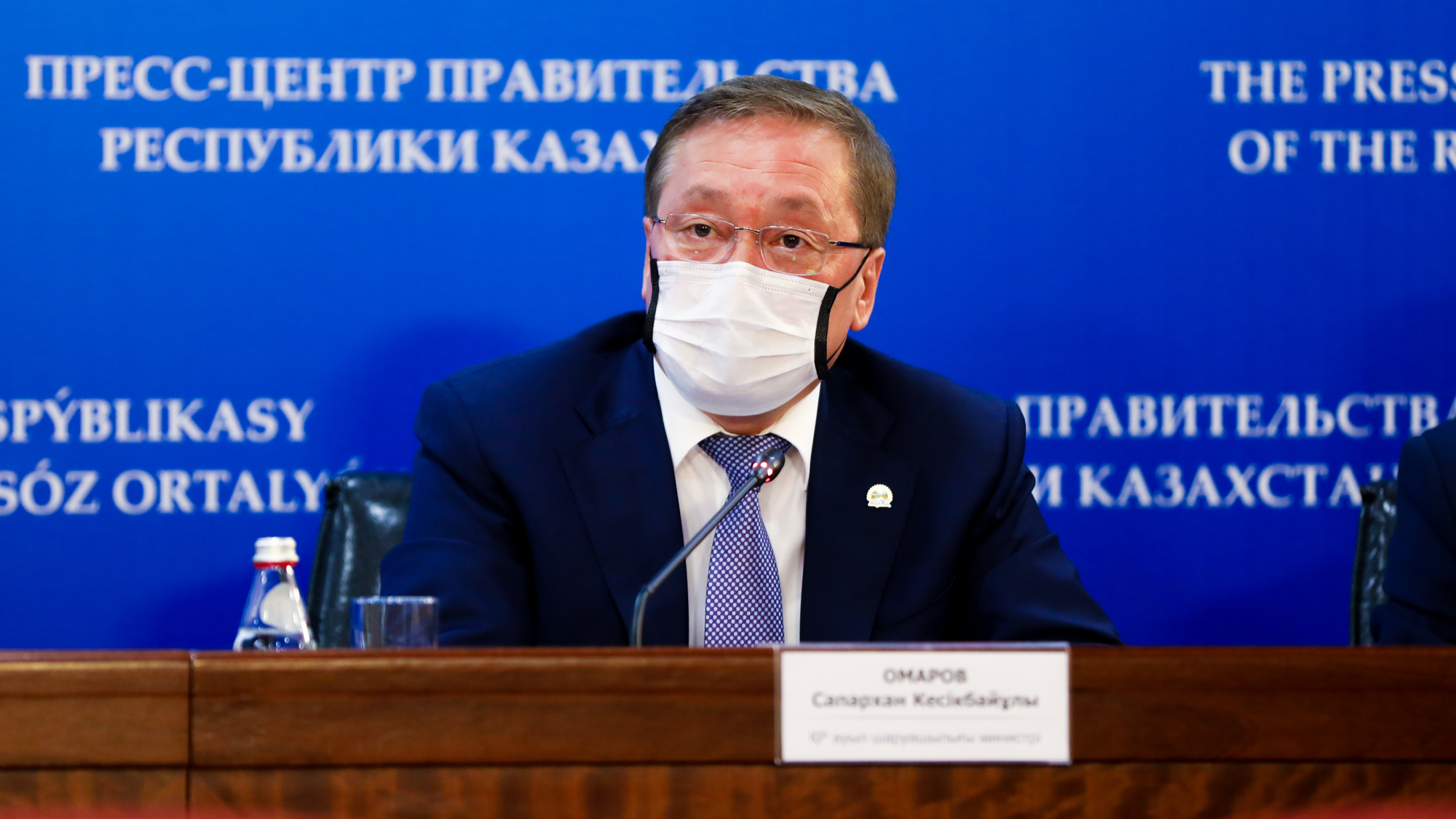19 May 2020, 13:53

At a press conference following the government session, Minister of Agriculture Saparkhan Omarov spoke about measures to support farmers, which are included in the Integrated Plan for Restoring Economic Growth by the end of 2020.
“The measures of the Integrated Plan, approved at the government session, are aimed at supporting and developing the agro-industrial complex, will first of all help us solve the issues of affordable financing for farmers,” Omarov said.
According to the minister, the introduction of guaranteed procurement of agricultural products on an annual basis will ensure guaranteed procurement of up to 365 thousand tons of agricultural products to provide the domestic market.
Talking about the forward procurement mechanism, Omarov noted that it was introduced on behalf of the Head of State. For this purpose, 24.5 billion tenge was allocated from the budget. About 365 thousand tons of agricultural products are planned for this amount. The purchase will be carried out on four types of products: wheat, barley, sunflower, buckwheat. The main purpose of the purchase is to provide the domestic market with raw materials for the production of certain types of socially significant food products.
“Today the Forward Purchase Rules will be registered. All organizational work has been carried out. The money has been transferred by the food contract corporation. Today, tomorrow, we will start accepting applications,” said the minister.
It also provides preferential microcrediting for agricultural producers at a rate of 6% per annum through KazAgro NMH JSC using guarantee instruments of Damu Fund JSC, which will ensure the availability of financing and increase the coverage of agricultural producers.
The introduction of such a tool as “agricultural receipts” will provide an opportunity to directly attract non-bank and trade financing. Estimated amount of financing will be 200 billion tenge annually with a growth potential of up to 70% of the annual amount of financing of agriculture.
“In order to support agricultural producers during the pandemic period, a deferment and restructuring of loans and leasing are provided through JSC KazAgro NMH,” the minister noted.
Omarov informed that KazAgro and its subsidiaries are already working on granting a delay on loans and leasing of agricultural machinery. Approved 2,231 applications with a deferral amount of 7.9 billion tenge.
“In order to discuss the postponement issues, agricultural producers need to contact KazAgro subsidiaries. This is the agrocredit corporation Fund for Financial Support of Agriculture and Kazagrofinance. The maximum term of delay depends on the size of payments and terms of lending, that is, consideration is made individually for each borrower,” Omarov said.
Several measures will be taken to provide raw materials. So, as part of the execution of the order of the President of the Republic of Kazakhstan, areas under highly profitable crops, such as oilseeds, fodder and vegetable and melon crops, will be increased. Also, in order to develop the raw material base, increase the load of processing enterprises and increase the export volumes of processed products, we plan to provide for the possibility of subsidizing oilseeds submitted for processing.
Negotiations will also be held with China to expedite the decision to include Kazakhstani enterprises in the register of importers for pork exports.
“The implementation of these measures will allow us to maintain our growth rates,” Omarov noted.
The minister spoke about the development of additional funds allocated for spring field work.
“This year, on behalf of the President, 170 billion tenge was allocated for spring field work under the Economy of Simple Things program. 70 billion tenge are currently fully utilized. We have already embarked on the development of 100 billion tenge under the Economy of Simple Things,” said Omarov.
All applications are accepted by the Agrarian Credit Corporation. It is planned to master all the funds by the end of the month.
The minister of agriculture also announced the deadlines for lifting the ban on the export of flour, grain and other food products.
“Limitations and quotas were introduced during the emergency to ensure the country's food security. But today, due to the removal of the emergency and due to the fact that the country is now fully provided with food products, the ministry plans to remove all restrictions and prohibitions from June 1. The relevant order is under discussion and approval,” the minister said.
In addition, Omarov spoke about spring sowing. According to him, there are all possibilities to carry out spring sowing at the established optimal time.
“The timely implementation of spring field work is the most important task of the Ministry of Agriculture, akimats and peasant farms. Work is already in full swing in all regions of the republic,” Omarov said.
To date, spring cereals and legumes are sown on 3 million hectares, or 20% of the plan. Oil crops have already sown a million hectares. This is almost 32% of the planned amount of work. Quite good rates for planting melons and potatoes — 309 thousand hectares or 65.5% of the plan were sown. The sowing of perennial grasses, cotton and sugar beets comes to an end.
“In general, 34.4% of the total sown area is sown today. Whereas in 2019, for the same period, 31.1% of the total sown area was sown. There are all possibilities to carry out spring sowing in the established optimum terms. All issues have been resolved to date, funding is provided, seeds are available,” the minister said.
Stay updated about the events of the Prime Minister and the Government of Kazakhstan - subscribe to the official Telegram channel
Subscribe